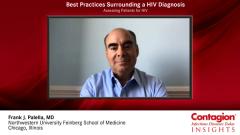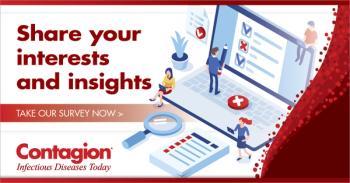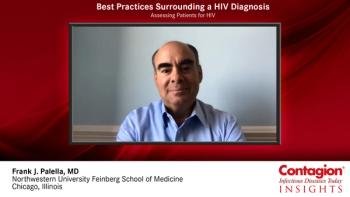
HIV Therapy and Cardiometabolic Concerns
Approaches that can help reduce the risk of weight-gain-related cardiometabolic conditions in patients with HIV.
Episodes in this series

Frank J. Palella, MD: The weight of a person—with or without HIV—can be an important signal of risk for overall health, risk for important cardiometabolic illnesses, and the intensity of surveillance necessary to screen for such illnesses or prevent them. A big part of achieving our overall objective of increased life span and increased health span for persons with HIV is helping them stay at a good weight, in a good body mass index category. In a world where some of the most modern therapies for the treatment of HIV can result in independent risks for weight gain, there’s even more vigilance that needs to be exerted.
When we encounter individuals gaining weight on therapy, particularly of a magnitude or rapidity that’s of concern, part of our approach has to be advising lifestyle changes or lifestyle modifications: exercise, healthy diets, a reduction in food intake, focusing on healthy foods, and avoiding other activities that might increase—in concert with weight gain—the risk for cardiometabolic disease like smoking, alcohol, or the use of recreational drugs. Clearly, it’s a role for us as health care providers of persons with HIV to provide an environment in which we’re supportive, encouraging, and attentive to weight-gain-associated trends, optimization of overall health status, and risk reduction of illnesses that can be associated with untoward weight changes, especially weight gain.
When we talk about cardiometabolic endocrine disorders associated with HIV, we’re not merely talking about risks associated with medications that we use to treat HIV or weight gain associated with such medications, which can potentially enhance the risk for some of these cardiometabolic outcomes. We’re also talking about the fact that the HIV infection itself, chronic HIV, even among persons who are virologically suppressed, involves excess ongoing long-term inflammation and immune dysregulation compared with people who don’t have HIV. Just the presence of HIV, even when optimally treated with virally suppressive therapy, includes excess risks for cardiometabolic, endocrine illnesses because of this systemic inflammation and immune dysregulation.
We know that even persons with well-controlled HIV have a greater likelihood at an earlier age for illnesses like coronary disease, hyperlipidemia, hypertension, and other conditions. The approach to the overall care of someone living with HIV needs to be the awareness that these are individuals who, irrespective of the therapies they’re receiving for HIV, are at enhanced risk for cardiometabolic endocrine abnormalities.
Transcript edited for clarity.
Newsletter
Stay ahead of emerging infectious disease threats with expert insights and breaking research. Subscribe now to get updates delivered straight to your inbox.

































































































































